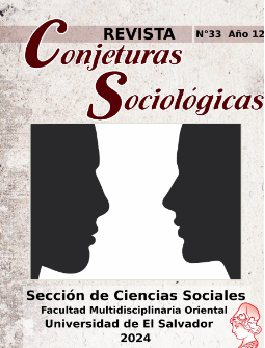Historical memory
conceptual aspects and perspectives from the experience of memory museums in El Salvador
Keywords:
memory, memory works, museum of memory, human rights, repopulation communitiesAbstract
The concept of collective memory refers to a social group that shares its memories seeking the meanings of the past from the position, of domination or oppression, of the sectors that comprise it, with which it aims to influence the construction of the social world. The efforts to recover experiences can be analyzed with the theoretical proposal defined as memory work. In Latin America, different States have implemented memory work, while in the Salvadoran case, communities organized in various places in the country have undertaken strategies for the reconstruction of historical memory. To understand part of this experience, historical memory is approached from the perspective of people who make up the teams of memory museums in El Salvador, in particular, their conceptions about memory, the objectives they pursue with memory museums and activities. educational activities they have carried out.
Downloads
References
Agencia EFE. (2021, enero 17). Bukele dice que El Salvador no debe celebrar un "pacto de corruptos". Agencia EFE https://www.efe.com/efe/america/politica/bukele-dice-que-el-salvador-no-debe-celebrar-un-pacto-de-corruptos/20000035-4442066
Álvarez, M. (2017). Reflexión crítica sobre la memoria colectiva: integración interdisciplinar, metodologías, tensiones y perspectivas. Raíces Revista Nicaragüense de Antropología, (2), 99- 113.https://www.camjol.info/index.php/raices/article/view/5864/5583 https://doi.org/10.5377/raices.v1i2.5864
CIDH. (2021). Situación de derechos humanos en El Salvador. 146 p. https://www.oas.org/es/cidh/informes/pdfs/2021_ElSalvador-ES.pdf
Comisión de la Verdad para El Salvador. (1993). De la locura a la esperanza: la guerra de 12 años en El Salvador. Naciones Unidas. 211 p. http://www.derechoshumanos.net/lesahumanidad/informes/elsalvador/informe-de-la-locura-a-la-esperanza.htm
Comisión Nacional de Reparación y Reconciliación. (2009). Recordar y narrar el conflicto. Herramientas. 149 p. https://www.centrodememoriahistorica.gov.co/descargas/informes2009/cajadeherramie ntas/presentacionbaja.pdf
Cuéllar, B. (2010). El Salvador. En Fundación para el Debido Proceso Legal. Las víctimas y la justicia transicional. ¿Están cumpliendo los estados latinoamericanos los estándares internacionales? 247 p. https://www.dplf.org/sites/default/files/1285258696.pdf
Delgado, C. (2008). Aportes de la teoría de la memoria colectiva al análisis político. Memoria y sociedad. 12(24), 115-124. https://revistas.javeriana.edu.co/index.php/memoysociedad/article/view/8172/6530
Fernández, R. (2001). La entrevista en la investigación cualitativa. Pensamiento actual. 2(3), 14-21. https://revistas.ucr.ac.cr/index.php/pensamiento-actual/article/view/8017
Garretón, F.; González, M. y Lauzán, S. (2011). Políticas públicas de verdad y memoria en 7 países de América Latina (Argentina, Bolivia, Brasil, Chile, Paraguay, Perú y Uruguay). Centro de Derechos Humanos. Facultad de Derecho, Universidad de Chile. 436 p. https://biblioteca.corteidh.or.cr/tablas/r27059.pdf
Halbwachs, M. (2004). La memoria colectiva (Vol. 6). Prensas de la Universidad de Zaragoza.
Jelin, E. (2003). Los derechos humanos y la memoria de la violencia política y la represión: la construcción de un campo nuevo en las ciencias sociales. Cuadernos del IDES (2), 27 p. http://biblioteca.clacso.edu.ar/Argentina/ides/20110517122520/cuaderno2_Jelin. pdf
Downloads
Published
Issue
Section
License

This work is licensed under a Creative Commons Attribution-NonCommercial 4.0 International License.
Los autores continúan como propietarios de sus trabajos, cediendo de manera no exclusiva los derechos de difusión a la Revista Conjeturas Sociológicas bajo los estándares de la Licencia Creative Commons Atribución No Comercial 4.0 Internacional (CC BY NC 4.0).





